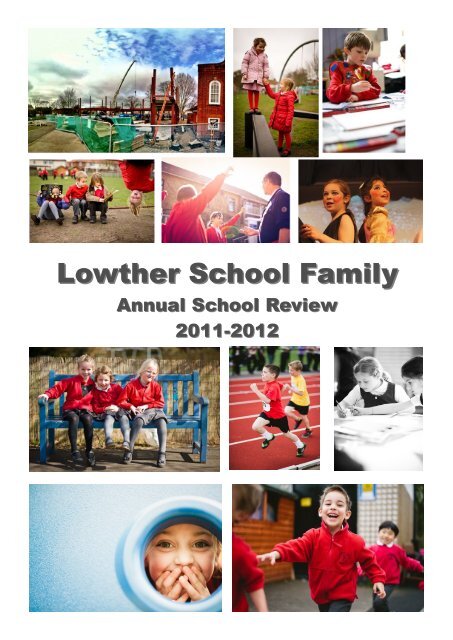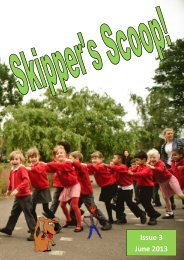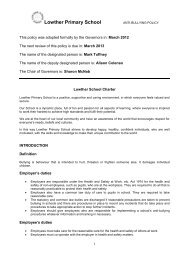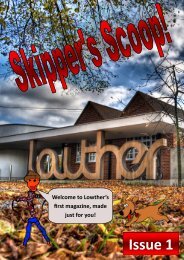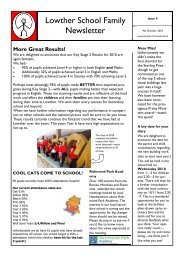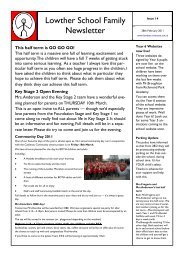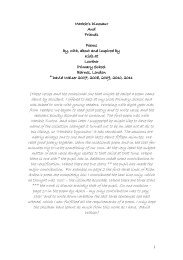Here - Lowther Primary School
Here - Lowther Primary School
Here - Lowther Primary School
You also want an ePaper? Increase the reach of your titles
YUMPU automatically turns print PDFs into web optimized ePapers that Google loves.
<strong>Lowther</strong> <strong>School</strong> Family<br />
Annual <strong>School</strong> Review<br />
2011-2012<br />
2012
Headship Team Overview<br />
Mark Tuffney , Alison Colenso and Carol Webster<br />
We are delighted to present the <strong>Lowther</strong> <strong>School</strong> Family’s annual self evaluation<br />
of the effectiveness of the our school. We have asked teachers to focus<br />
their reports on assessment, surveys, opinions, feedback and key data<br />
as well as providing a narrative of life in their classroom.<br />
We want the evaluation to be exactly that — an evaluation of the success of<br />
the year and to provide us with the information to pinpoint<br />
key areas for school improvement for academic year<br />
2012/2013 and beyond.<br />
A love of school<br />
Children at <strong>Lowther</strong> love<br />
coming to school and love<br />
learning. This underpins<br />
everyday school life. We<br />
must stress the impact that<br />
adults that work in the school have on this. The way<br />
they model positivity and happiness helps to create a<br />
special atmosphere in the school. Every day the children<br />
amaze us with their energy, their enthusiasm, their<br />
willingness to go that extra mile and their love of being<br />
at school inspires us all daily.<br />
Leading <strong>Lowther</strong><br />
Leadership of <strong>Lowther</strong> comes from the way that everybody<br />
works together at the school. We try to lead<br />
<strong>Lowther</strong> with a unified shared passion and vision. This<br />
year we have re-evaluated the formal structures we<br />
have in place to deliver a true distributive leadership<br />
model. This will mean that the traditional key stage<br />
leaders role are replaced by the following strategic<br />
roles in each phase of the school<br />
<br />
<br />
<br />
<br />
Teaching and learning<br />
Curriculum<br />
Assessment and Data<br />
Community partnership and enrichment<br />
Q. How good are we at helping you with learning<br />
Very Good Good OK<br />
Poor<br />
59% 27% 13%<br />
1%<br />
Q. How happy do you feel at <strong>Lowther</strong><br />
Yes mega Yes very Yes quite A bit<br />
70% 15% 6% 7%<br />
Very<br />
Poor<br />
0%<br />
No<br />
2%<br />
<br />
Administration<br />
This will be an important part of school improvement for<br />
2012/2013. The aim is that more people have a say in<br />
the way the school is led and that there is increased<br />
cross phase partnerships for greater continuity across<br />
the school.<br />
Our Focus on Teaching and Learning<br />
The key drive for the school as we move forward must be to deliver the very highest quality teaching and learning.<br />
We have supported teachers this year through a range of professional development opportunities, mentoring<br />
and observations.<br />
For the academic year 2011-2012 we have seen<br />
<br />
<br />
<br />
2 Outstanding lessons<br />
24 Good lessons<br />
11 Satisfactory lessons<br />
Teaching across the school is good. We need to push teaching on so that over 80% of lessons are good or better<br />
(it is was 70% this year) . This should be THE key priority for the school in 2012/2013.<br />
Teachers have worked hard to develop their practice and we have a number of professional development opportunities<br />
planned for next year including sharing practice, courses, Inset and staff training.<br />
Teachers and support staff all share the passion and enthusiasm for working at <strong>Lowther</strong>. Their commitment is<br />
fantastic and makes such a difference to the day to day life at <strong>Lowther</strong>.
Academic Results 2011-2012<br />
We strive for very high academic performance coupled with an enthusiasm for school and for learning. Results at<br />
EYFS, KS1 and KS2 should once more reflect children’s positive attitude to learning.<br />
EFYS data — The Foundation Stage<br />
The learning in the Foundation Stage has continued to be active, exciting and busy. The children in the Nursery<br />
have made good progress throughout the year. Their progress has been tracked using the borough tracking<br />
spread sheet which we have adapted to show progress within each age band by introducing categories of emerging,<br />
consolidating and secure. This has shown that some are working within the 40– 60 months age band but<br />
most children are working within the expected developmental level (30-50 months) having started the year within<br />
a range of developmental stages. At this stage children’s age plays a particularly large part in their attainment.<br />
Most of the reception children are working within the Early Learning Goals in all curriculum areas and some children<br />
are working above the expected levels in most areas of the curriculum. Many of the children have made considerable<br />
progress after starting at a developmental stage below their chronological age. Considering nearly half<br />
of the current reception children are summer born this is a very good achievement. Profile results in all areas were<br />
comparable with the national average and in some areas higher.<br />
In reception we have accessed training in phonics teaching through the SLL project and as a result all feel confident<br />
that our phonics teaching is robust and the children are working at the expected level of the <strong>Primary</strong> National<br />
Strategy scheme ‘Letters and Sounds’. End of year data in the Early Years Foundation Stage Profile shows that<br />
97% of the children are working within the Early Learning goals for Linking Sounds and Letters and 90% achieving<br />
6+ points. This should impact upon reading and writing levels in KS1 in the future.<br />
National Average <strong>Lowther</strong> 2010 <strong>Lowther</strong> 2011<br />
DA 6+ pts 91% 89% 85%<br />
DA 8+pts 49% 49% 52%<br />
LSL 6+pts 79% 80.9% 90%<br />
LSL 8+pts 34% 42.5% 43%<br />
W 6+ pts 67% 57.4% 62%<br />
W8+ pts 24% 19% 20%<br />
This indicates that the phonics teaching is now having more of an effect on both the writing and Linking Sounds<br />
and Letters achievements. However, the large number of summer born boys within both classes also affects the<br />
writing achievements and this links with the development of fine motor control within this year group.<br />
Focuses for next year: Physical development linked to fine motor control – effective pencil grip. To investigate<br />
further: gender and age differences in writing through gap analysis of results.<br />
However, next year the EYFS curriculum is changing and a ‘best fit’ model leading to ‘working towards, expected<br />
and exceeding’ will replace the points score system.<br />
The recent external moderation of the early years foundation stage profile in the reception classes validated our<br />
judgements, noting that the evidence is robust and praised the wide range of methods used to collect information<br />
- teacher knowledge, written notes, photos, videos, children’s work, parents information and information from<br />
other adults. They noted that the ‘teachers and teaching assistants know the children well in both classes and<br />
are able to tell the stories behind their judgments both with confidence and accuracy’. The foundation stage environment<br />
was commended by the moderators as one which would support the children’s learning.<br />
Indeed earlier in the year Tina Bruce described it as ‘a breath of fresh air!’ – praise indeed.
Key Stage 1<br />
Pleasing results were obtained by children in Year 2. This is the first time we have two forms of entry in Year 2.<br />
Processes for gathering evidence and systems are excellent — feedback from an external moderation quoted<br />
“Good teamwork, robust systems and procedures”<br />
From the data we can see a key group of pupils is evolving — children who are achieving or expect to achieve a<br />
secure 2b or 2a in Key Stage 1. These are children we should be looking to target support at with the view to<br />
achieving Level 5 in Year 6. We recognised this could be a focus last year — this years data fully supports this.<br />
Results of pupils are indicated below.<br />
Year 2<br />
National Avergae<br />
at 2B+<br />
<strong>Lowther</strong><br />
2011<br />
2B+ 2a+ 3<br />
Reading 85<br />
92 86% 54% 32%<br />
Writing 81<br />
88 76% 44% 13%<br />
Maths 89<br />
100 93% 71% 26%<br />
Science 89<br />
92 93% 51% 0%<br />
2012<br />
The newly introduced “phonics screening” for Year 1 pupils provided us with a set of results that were not reflective<br />
of either the children’s ability or the quality of teaching taking place in both Reception and Year 1. Results are<br />
below both the national average and also are own expectations. We will investigate this further as part of the<br />
school’s improvement plan for 2012-2013. However, what is clear is that we have to “play the game” which perhaps<br />
we have not done with this.<br />
KS1 Phonics<br />
Screening<br />
Results 2012<br />
Percentage of<br />
pupils over 32<br />
marks<br />
Borough Average<br />
Number of pupils 61.5% 65.2% 70%<br />
Target for<br />
2012/2013<br />
Year 1 pupils working hard<br />
and enjoying a balanced<br />
curriculum - Reception<br />
teachers and Year 1 teachers<br />
work closely together<br />
to ensure a smooth transition<br />
for children.<br />
Play is such an important part of<br />
school life - as displayed by a very<br />
happy year 1 pupil<br />
Year 1 pupil proudly displays their<br />
“extra” homework
Key Stage 2<br />
A new year a new Year 6 cohort. We are expecting this year’s class to slightly exceed our initial predictions. They<br />
have needed a lot of support as a group to stay focused on learning. Some individual results will be excellent (and<br />
well deserved) We still need to look at ways we can boost more children to work towards achieving Level 5.<br />
Pleasingly 3 children took the new Level 6 paper in Maths and 2 took the English paper.<br />
National<br />
average<br />
2010 2011 2012<br />
(predicted)<br />
(approx.)<br />
English<br />
L4<br />
80%<br />
95%<br />
91%<br />
87%<br />
L5<br />
(30%)<br />
(32%)<br />
(27%)<br />
(17%)<br />
Maths<br />
L4<br />
80%<br />
86%<br />
91%<br />
96%<br />
L5<br />
(35%)<br />
(36%)<br />
(50%)<br />
(43%)<br />
English and Maths (combined)<br />
L4<br />
82%<br />
89%<br />
91%<br />
83%<br />
L5<br />
(11%)<br />
(21%)<br />
(23%)<br />
(13%)<br />
Science<br />
L4<br />
92%<br />
100%<br />
100%<br />
96%<br />
L5<br />
(43%)<br />
(68%)<br />
(77%)<br />
(65%)<br />
These results again show 2 key patterns. 1) A difference between English and Maths and 2) The number of pupils<br />
achieving Level 5 in Maths and Science compared to English. This difference is especially noticeable when looking<br />
at Level 5 in Writing and Maths (Reading 39%= L5 where as Writing only 13% = L5)<br />
Managing Assessments<br />
The way that assessments are organised are crucial for the children.<br />
We must remember we are a primary school and strive to make any assessments a positive experience for children.<br />
Year 6 tests should be like graduation (see pic below!) Year 1 and Year 2 assessments should just be a<br />
“normal” part of school life. Already there are more plans to introduce further assessments in English at Key<br />
Stage 2 - we must give pupils the best chance to do well without teaching to the test or placing pressure on children.<br />
This also needs to be managed carefully with regard<br />
parent expectations and any potential pressure placed<br />
on children.<br />
Our children achieve good results because they work<br />
hard, like learning and are well taught and supported<br />
by school and home.<br />
Year 2 pupils studying<br />
hard in Maths<br />
Year 6 graduate “<strong>Lowther</strong><br />
style”<br />
Year 2 pupils—happy, relaxed and enjoying school
Celebrating Success<br />
We run lots of incentives for the children and for classes, a summary of these are illustrated below.<br />
Class<br />
Number of<br />
Golds<br />
Willow 16<br />
Oak 17<br />
Beech 18<br />
Pine 16<br />
Maple 19<br />
Elm 19<br />
Year 3 16<br />
Year 4 14<br />
Year 5 16<br />
Year 6 16<br />
<strong>Here</strong> are the results to date. As you can<br />
see, every class has achieved an impressive<br />
number of gold certificates on the<br />
weekly behaviour target—with Maple and<br />
Elm classes jointly leading.<br />
‘Class of the week’ has been won most<br />
times by Elm and Pine classes.<br />
Year 5 have had the best weekly attendance<br />
- an amazing 9 times this year.<br />
Inter-class competition has been healthy<br />
with each class proudly displaying their<br />
certificates outside their classroom. This<br />
creates an impressive visual too.<br />
Class of the<br />
Number of<br />
Class<br />
Weekly best<br />
Willow 4<br />
Oak 3<br />
Beech 4<br />
Pine 8<br />
Maple 6<br />
Elm 8<br />
Year 3 5<br />
Year 4 5<br />
Year 5 5<br />
Year 6 4<br />
Willow<br />
Oak<br />
Beech 2<br />
Pine<br />
Maple 4<br />
Elm 3<br />
Year 3 6<br />
Year 4 3<br />
Year 5 9<br />
Year 6 5<br />
93 children have been awarded the ‘Golden Standard’ this year. These children have all displayed<br />
learning characteristics above and beyond what we expect. They represent ‘True <strong>Lowther</strong>’.<br />
They receive badges, a certificates and their photograph outside the Headship room.
Attendance, Behaviour Targets, Class of the Week and The Golden Standard<br />
Celebrating success, either as an individual or as a class,<br />
is at the absolute forefront of everything we do. Each week<br />
classes strive to earn bronze, silver or gold certificates for<br />
their efforts in achieving the behaviour target. In addition to<br />
the behaviour target, staff members can nominate classes<br />
to be ‘Class of the Week’. Attendance is also monitored<br />
and the class with the best attendance each week is<br />
awarded a special ’Cool Cats’ certificate. However, the<br />
crowning glory of certificates has to be the ‘Golden Standard’.<br />
Children who reach this standard receive a special<br />
certificate, badge and their photo on our ‘Golden Wall’.<br />
The <strong>Lowther</strong> Family League<br />
board where weekly awards are<br />
The ‘<strong>Lowther</strong> Champions’ cup.<br />
This is now awarded to the<br />
‘Class of the Week’<br />
Year 6 children<br />
reading at lunch<br />
for our ‘Read lots<br />
of books’<br />
behavior target.<br />
Behaviour Targets<br />
A different target is set each week for the children to help make the school an even better place. Below are<br />
some of the targets set this year with the results on the right hand side.
Developing the vision for the school site<br />
It is difficult to describe the rollercoaster that has been the school site this year. We have a first class building being<br />
constructed by a committed and enthusiastic team. One that will stand out as a space that will engage and<br />
inspire pupils. It will also provide wonderful opportunities for teachers to enrichment learning through ICT and<br />
cooking as well as providing great space to take focus groups and children with additional needs. The ever growing<br />
staff numbers will have a space that will be a pleasure to relax in. We’re so proud of the way that governors<br />
and the school have worked side by side to first have the vision for the school site (a long time ago now!) and to<br />
see it through. It is a great example of a shared and unified vision and of teamwork.<br />
Other site developments<br />
Dave and Sharon have worked tirelessly to support and manage<br />
the school site. The grounds are impressive and are something the<br />
whole community can feel proud of. We were delighted to improve<br />
the Nursery and Reception classes outside space. Our aim is simple<br />
— use our wonderful<br />
school grounds and buildings<br />
to maximise learning<br />
opportunities for the children.<br />
When the new building<br />
is complete the vast<br />
majority of the space on<br />
the site will be the children’s.<br />
New developments this academic year<br />
Flexibility<br />
Pupils, parents and staff have been so<br />
adaptable and flexible to the temporary arrangements<br />
in place this year. No library, no<br />
canteen, no SEN base, no break out space,<br />
no sports court = no problem .We think that<br />
speaks volumes.<br />
We are always looking to develop school life so that it is even better for our children.<br />
We now have a school council. 8 representatives were elected<br />
by their peers in January. So far they have set (and are<br />
running) the school tuck shop, have introduced “different<br />
sport Thursday” and have evaluated the school meal service<br />
for 2012-2013. The children's enthusiasm and commitment<br />
to this has been outstanding.<br />
We want to develop music in the school. We have begun to<br />
see this take shape with a recorder club and several musical<br />
performances including a wonderful collaboration with<br />
Colet Court, We intend to use one of the “spare” classrooms<br />
next year as a music room to aid the development of this<br />
curriculum area.<br />
We have reviewed our systems for recording and interpreting data. To ensure greater consistency and<br />
ease of tracking year on year we will use a new system (Integris) next year. This will allow teachers to<br />
identify more easily targets groups and under performing pupils.
Notable successes<br />
There have been many successes this year, some that have stood out are:<br />
Handwriting — this has been an area of focus, with daily handwriting sessions going on across the school and a<br />
new display area to showcase children’s work. This alongside spelling will be an area of focus in 2012/13.<br />
Behaviour targets — Alison has refreshed and invigorated the weekly behaviour targets with challenges that are<br />
child centred and focused on improving school life for all. The results for the year show the positive effect they<br />
have had on the school community.<br />
Provision for more able pupils — the work of Kathy Moore-Stanley has been fundamental to driving this. We<br />
have had children entering into Maths challenges, Level 6 study support and more. As our intake changes we<br />
would like Millie and Kathy to continue to drive these changes.<br />
Enrichment opportunities — with an average of 8 trips per class, numerous visitors and speakers, events galore<br />
the enrichment that takes place at <strong>Lowther</strong> underpins the school ethos of happy, enthusiastic learners. This will<br />
continue as we expand.<br />
New staff meeting format and staff CPD — our old Monday staff meeting time was handed over to being focused<br />
on staff professional development this year. The staff meeting is now in a much shorter, slicker slot on a<br />
Friday morning. The benefit of this has been a greater opportunity to deliver quality CPD for staff. This will continue<br />
next year.<br />
Managing growth to 2 form-entry — we are pleased with how we are gradually adapting practice and evolving<br />
with the increasing number of pupils at <strong>Lowther</strong>. The way this change is managed has been smooth and will continue<br />
to be a priority as the school has 4 more years of expansion left.<br />
Staffing and Leadership<br />
Developing a new team — our new team are exactly that—a team. We have<br />
been delighted with the way everyone (parents, pupils and staff) have gelled and<br />
settled into being a new school family. Teachers have been totally committed<br />
and enthusiastic. To support our sense of team we have introduced regular staff<br />
social events this year.<br />
Targets in Key stage 1 — Hong King Phooey targets were introduced to KS1<br />
this year. Teachers have supported this well (especially in Year1 ) where learners<br />
have delighted in telling us they've smashed a target.<br />
We have been delighted with the way the new team have gelled. There is a great sense<br />
of camaraderie amongst the team. Governors support last year in helping recruit and<br />
select so many new staff was instrumental to this. Kathy Jenkins, Sally Taylor, Emily<br />
Blaxland, Sarah Tennant, Emily Treble, Alison Colenso, Paul Nelson, Jim Pritchard and<br />
Kathy Moore-Stanley have all added something extra to <strong>Lowther</strong> and have become key<br />
parts of the team. Our staff are varied in personality and skill — and this is something we<br />
need to tap into more. Our new leadership structure for 2012/13 should support this. Alison,<br />
Carol and Wendy form an experienced, supportive and highly skilled leadership<br />
team who will continue to develop and nurture future leaders.<br />
The wider team<br />
We now have nearly 50 staff. The shared enthusiasm, skill and commitment is outstanding.<br />
The understanding and belief in the <strong>Lowther</strong> <strong>School</strong> Family is evident every single<br />
day.<br />
Our team going forward will be settled for next year with no-one moving on. We have 2<br />
NQTs starting as Alison moves out of the classroom and our expansion continues. This<br />
should create some stability, but also allow us to really move our staff focus on as the team are settled in their<br />
roles.<br />
Focus for the future<br />
We need to raise expectations for all teachers so that classroom practice is consistently good or better. Each of<br />
our staff have the skill and passion to be excellent teachers. We must look at strategies that allow our very best<br />
teachers to share their skills and expertise with the wider team.
ICT developments<br />
Children have had even better ICT opportunities this year. We have worked alongside RPA to allow the children<br />
to design websites, make movies as well as trying Photoshop skills like colour popping. These are all showcased<br />
on the schools website. This has also continued to improve — with new sections this year<br />
including an art gallery, blogs for Key Stage 2, homework support sections and a video gallery.<br />
Steve Oldfield has worked wonders on this. Our core ICT provision is far better now<br />
that Sarfie Ghamloush’s technical support has meant far greater reliability of ICT equipment<br />
this year. We have extended the hours he supports the school with as our new ICT suite will<br />
have an additional 30 computers as well as the 4 new classrooms.<br />
ICT is a life skill for pupils and has very high pupil enjoyment. We look forward to seeing even better provision for<br />
pupils next year.<br />
The Whole school is growing…<br />
Our school roll now exceeds 250 pupils (plus a further 52 in the Nursery.) This will rise to 400 pupils by 2015. It is<br />
good that pupil numbers are meeting the Borough’s forecast and that there is demand for a 2 form entry primary<br />
school in North Barnes. Our challenge is to not lose the unique intimate atmosphere that makes <strong>Lowther</strong> special.<br />
Our intake remains fairly stable now with 19% Free <strong>School</strong> Meals, 33% English as an additional language, 45%<br />
White British and our social demographic stabilising over the last 3 years. We must continue to monitor these factors<br />
closely to ensure our provision meets the needs of our whole school community.<br />
Motivated learners — at home and school<br />
We are extremely proud of how self-motivated the children<br />
are to learn new things. This extends to home too. We have<br />
children taking their learning experiences from school and<br />
experimenting at home (and also vice versa) This is something<br />
we would all like to see continue to flourish. Developing<br />
ways home and school can work together to raise standards<br />
and expectations are important. Successful examples of this<br />
during 2011/12 have been<br />
Maths day, homework challenges, Year 1 portrait gallery,<br />
homework support on the website, target meetings as well as<br />
newsletters and regular communication.<br />
A day at <strong>Lowther</strong>…..<br />
No two days at <strong>Lowther</strong> are the same —<br />
but there are key strands that run<br />
through the school — strengths which<br />
we must build on in the future. All members<br />
of the school family understand<br />
these values and model them every day.<br />
Learning in<br />
interesting<br />
ways<br />
Promotion of<br />
health and<br />
well-being<br />
(including<br />
happiness<br />
and emotional<br />
growth)<br />
Enthusiastic learners Children proud of their school Celebration of success
Making <strong>Lowther</strong> an exciting place to learn<br />
<strong>Lowther</strong> IS an exciting place to come to school. We have provided numerous events, activities and enrichment and<br />
learning opportunities during the course of this year. Some of those are illustrated below.<br />
Takeover Day <strong>Lowther</strong>’s Got Talent The Nativity Grounds Afternoon<br />
The challenge now is how we balance the wonderful curriculum enrichment<br />
with a focus on improving classroom practice.<br />
We believe the two to be intrinsically linked — as pupils fully involved<br />
in school life, feeling happy and enthusiastic make the best learners.<br />
The onus is now on teachers to deliver consistently excellent lessons<br />
alongside all the all other wonderful things they do to make <strong>Lowther</strong><br />
Survey results indicate we are good at enrichment.<br />
Q How good are we at giving you exciting opportunities to learn in different ways<br />
Community Day<br />
Very Good Good OK Poor<br />
Improving every year<br />
78%<br />
14%<br />
7%<br />
1%<br />
Review of this report, class performance,<br />
feedback and other data sources indicates<br />
the following should form the backbone of the school improvement plan for 2012-2013<br />
Very<br />
Poor<br />
0%<br />
<br />
80% of teaching to be good or better<br />
Focused support on the academic performance of children achieving 2b/2a at the end of Key Stage 1<br />
Enrichment opportunities for our most able learners (L2 at Y1,L3 at Y2, L4 at Y4)<br />
<br />
<br />
<br />
Consolidation of change (and management of this)<br />
Establishment of new strategic leadership roles<br />
Closing of the gap between pupil attainment in English and Maths<br />
Increasing the number of pupils achieving Level 5 in English at the end of Year 6<br />
<br />
Improving standards in spelling, handwriting, grammar and punctuation through developing a strategic plan<br />
Review of phonics teaching from Nursery to Year 3<br />
These will be fed directly into the school improvement plan as we try to focus on having a clear strategic plan for<br />
developing life at <strong>Lowther</strong> for our school community.<br />
Happy learners = successful learners<br />
So what next for The <strong>Lowther</strong> Family Apply the formula<br />
above, sprinkle with enthusiastic and skilled<br />
teachers and a supportive team. Add in positive and<br />
pro-active parents and astute governorship and<br />
we’re heading down the right path. The changes<br />
keep coming thick and fast and <strong>Lowther</strong> keeps moving<br />
forward. That’s what we all want—a school that<br />
creates the very best opportunities for our children.


